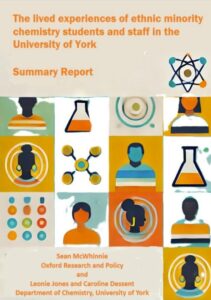The Lived Experiences of Ethnic Minority Chemistry Students and Staff in the University of York
This report summarises the experiences of ethnic minority chemistry students and staff in the Department of Chemistry at the University of York, based on survey data and discussion groups with students, and 1-to-1 discussions with staff conducted between 2020 and 2023.
You can read the summary report here.
The University of York’s Department of Chemistry has actively worked to support the careers of women in science since 2003. This work has resulted in the Department nurturing the careers of a growing number of highly successful women chemists and building the numbers of female students and staff. Through the policies and practice developed, gender equality has been embedded in the department’s culture to the benefit of all its members. York Chemistry works extensively to share its experience across the UK and International scientific community and is well recognized as a beacon department for encouraging widespread positive actions towards gender equality in scientific careers.
York Chemistry is keen to use this experience, to build the best possible environment to support ethnic minority students and staff. This report outlines the findings of an initial listening exercise of ethnic minority staff and students in Chemistry at York. The primary aims are to allow the department to identify the ways in which individuals experience racism, understand career aspirations and bottlenecks, and identify practical actions that could be put in place to encourage individuals to continue with chemical careers. A secondary aim was to develop research tools, and disseminate them with other departments.
A total of 255 students started the survey, a response rate of 36.2%. The majority of those who responded to the survey were female. The response rates by gender were 46.0% for females and 21.5% for males. 92% of respondents were home students. Overall, 35 respondents (24 home and 10 overseas; 23 female and 10 male) self-identified as having non-White ethnicity. Discussions were held with groups of ethnic minority UG and PGR students. Two discussion groups were held with UG students, one with home domiciled PGR students and one with overseas PGR students. Discussions were also held with two ethnic minority members of research staff and two ethnic minority members of professional and support staff. Three one-to-one discussions were held with ethnic minority members of academic staff.
There is a need to extend this work to other chemistry departments so that a better understanding can be gained of how the experiences of ethnic minority students and staff vary across diverse departments, and with geographic location.
Key findings
Students and staff recognised York’s strong academic reputation as a major factor in choosing the department, but noted that limited cultural facilities in the city — such as places of worship, specialist hairdressers, and affordable ethnic food shops — may discourage some potential applicants.
Most students felt part of the department community, but ethnic minority and female students were less positive than their peers. A lack of role models from ethnic minority backgrounds was highlighted, alongside appreciation for steps taken to decolonise the curriculum.
Few participants reported overt racism in the department, but microaggressions and subtle biases were more common, particularly among international students. Some students and staff also raised concerns about the impact of ethnicity on career progression. Overseas students and staff reported additional challenges, including cultural adjustment, accommodation difficulties, and limited recognition of non-Christian holidays.
Moving forward
Overall, while the Chemistry Department at the University of York is making strides toward inclusivity for the ethnic minority individuals in its community, there are opportunities to better support ethnic minority students and staff, particularly in addressing subtle biases and fostering a more culturally aware environment.
Recommendations include
- Developing cultural awareness training and develop mentoring programs tailored for ethnic minority students.
- Increasing efforts to recruit and retain ethnic minority staff and promote visible role models.
- Expanding support for international students, including accommodation assistance and better recognition of cultural holidays.
- Continuing the focus on decolonisation efforts for the curriculum.
- Improving transparency and communication around reporting processes for bullying and race-related incidents.
- Celebrating diverse cultural events to foster an inclusive environment.
- Recognising non-Christian holidays and improve understanding about when the need of overseas staff and students to take extended holidays to visit family overseas.





